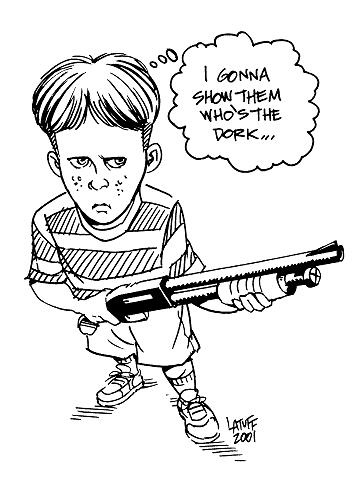Angry, Armed and White: The Typical Profile of America's Most Violent Extremists
White men, usually right-wingers, are the dominant threat.
By Steven Rosenfeld
There’s no shortage of crime statistics confirming this. A 2001-2015 “Homegrown Extremism” analysis by the New America Foundation parsed the “ethnicity, age, gender and citizenship” of people who killed or violently attacked others, whether they were motivated by jihadist philosophies or other “right wing, left wing or idiosyncratic beliefs.” Of 448 extremists counted, white men who were U.S. citizens outnumbered every other demographic by wide margins.
“Quite a few reports agree, that more Americans have been killed by the radical right since 9/11 than by jihadists,” said Mark Potok, spokesman for the Southern Poverty Law Center, which tracks hate crimes and focuses on the radical right.
“What they have in common is that once they begin to ideate this philosophy, whatever their passion is, whatever their hatred is, whatever their ideology is, they certainly all begin to communicate this to people around them,” Navarro said. “And when we go back and do the post-event analysis, we find that they were talking about this, they were telling people about this, and the people either ignored it, didn’t pay attention or didn’t think it would go any further.”
Potok, the SPLC spokesman, said that domestic law enforcement did not want to believe that white people could be terrorists—or even violent extremists—until Timothy McVeigh bombed the Oklahoma federal building in 1995. Then they shifted gears and focused on many domestic anti-government and ideological groups. But that focus changed, he said, after the 9/11 attacks in 2001, as law enforcement again saw radical Islam as the primary threat.
Chapel Hill Murders Are About More Than a Parking Dispute
People miss the point that the rationale for the rampage need not amount to an either/or.
By Cynthia R. Greenlee
The point they miss is that the rationale for Hicks’s rampage need not amount to an either/or. It’s not hate crime or parking dispute. Parking disputes are rarely just about occupying one asphalt rectangle. Fights over space—whether in subways or suburban neighborhoods—are more often contests about privilege: Who gets to be in this space? Who dictates the use and control of the space? And what happens when people who aren't like some pre-determined and overdetermined notion of what constitutes "us" gets in our space? A parking crunch—and I acknowledge the rancor that can come when fences have not made good neighbors—did not pull the trigger. A man did, a man we know, at the very least, to have a measure of antipathy toward the religious of all faiths. Of the three people he shot, execution-style, all were observant Muslims, and two were women who wore a style of headscarf that made that clear.


No comments:
Post a Comment